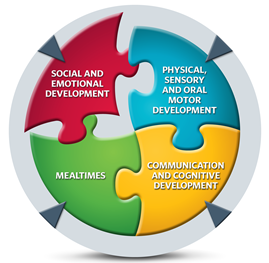 Underlying medical conditions or prolonged hospitalization may be associated with disruptions in social and emotional development.
Underlying medical conditions or prolonged hospitalization may be associated with disruptions in social and emotional development.
Difficulty achieving a state of regulation e.g.
- Baby may be generally unsettled and irritable, may cry excessively and have difficulty sleeping. e.g. Colic, Gastro-oesophageal reflux. Babies who seem to cry excessively can be difficult feeders. They may feed too much, too often or too little.
- Infant may sleep through feeds and be difficult to arouse.
Disrupted parent-child interactions characterized by lack of mutual engagement e.g.
- Parent may be unavailable emotionally to respond to baby’s cues. (e.g. due to parent depression)
- Baby may not provides cues or cues may be subtle and difficult to interpret.
May be associated with difficulties regulating appetite, force feeding or lack of enjoyment of feeding.
Need for independence is not recognized or supported by parent e.g.
- Parent anxiety drives need for control – insists on feeding child to ensure all food is eaten.
- Child not trusted to recognize satiety.
Associated with mealtime conflict, use of distraction, coercion and force feeding leading to further food refusal.
Delays in social and emotional development e.g. Autism Spectrum Disorder, Pervasive Developmental disorder not otherwise specified (PDDNOS).
May also be associated with delays in cognitive development.
- Avoids engaging in reciprocal social interactions of mealtimes.
- Not motivated by role models or copying what others eat.
- May not recognize hunger and satiety or understand that eating resolves hunger.
Ongoing difficulties with emotional and behavioural regulation – older child e.g.
- Generally anxious or depressed and withdrawn
- Lacks psychological flexibility to cope with minor disruptions or variations in routines. Tantrums easily - difficult to calm.
- Lacks confidence to engage in age appropriate exploration and independent activities including feeding. Relies on parent more than peers.
- Irregular eating and sleep patterns.
- High levels of parent – child conflict.
May be associated with
- Mealtime conflict or
- Lack of appropriate limit setting.
Further reading:
Chatoor, I. (2009) Diagnosis and treatment of feeding disorders in infants, toddlers and young children. Washington, DC: ZERO TO THREE.
Jordan, B., Therapeutic play within infant–parent psychotherapy and the treatment of infant feeding disorders. Infant Mental Health Journal, 2012. 33(3): p. 307-313.